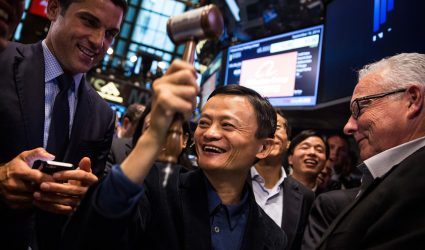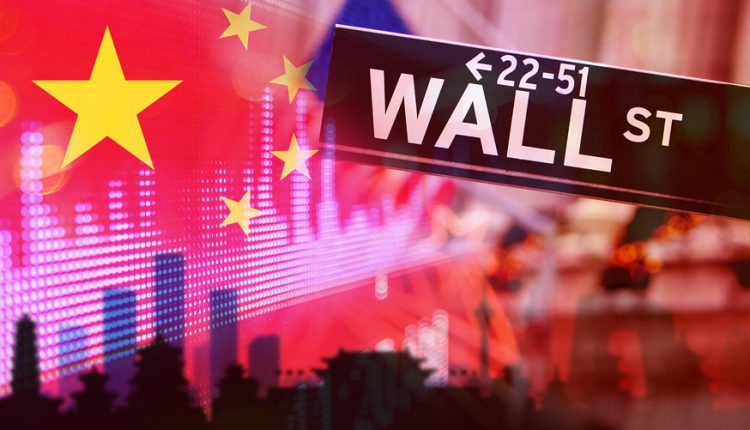A year into trade war, Wall Street is the latest front for US suspicions about China

(SCMP) – Fraudulent practices and transparency issues underscore markets’ long-standing fears about a country that lacks commitment to the rule of law. US Securities and Exchange Commission leads cries for vigilance as investors become more exposed to Chinese stocks.
Chinese wealth manager Jupai Holdings started trading on the New York Stock Exchange in July 2015. A large firm investing money for well-off Chinese, Jupai was touted as a growth story for US investors – a way to tap into the budding but fast-growing Chinese financial market.
It did not turn out as promised. Just two years later, the Shanghai firm was sued by Ninespot, a California-based video live streaming start-up, for fraud and breach of contract.
According to court documents, Jupai failed to execute on a signed contract to invest US$18 million in Ninespot. The start-up was forced to close shop and decided to take Jupai, which manages US$8 billion in assets, to court.
Since then, Jupai’s stock began a precipitous slide, dropping more than 90 per cent in two years, to US$2.23 a share this month. In that period, US investors collectively lost nearly US$900 million.

Jupai and Ninespot did not respond to requests seeking comment, and such disputes – where the investing party is sued for walking away from its legal commitment – are clearly not limited to Chinese investors or businesses. But the case underscores a long-standing worry on Wall Street about companies from a country with no real history of commitment to the rule of law.
Even as China’s economy expands, US investors’ cry for vigilance concerning Chinese firms has grown louder – with Wall Street the latest front seeing US disengagement from China. Since the start of the trade war a year ago, Washington and Beijing’s battle over tariffs has already spurred the two countries to decouple on trade, technology and cultural and research exchanges.
These cries go beyond contract disputes to longstanding suspicions about vague, sometimes unreliable, financial reporting by these companies, and their across-the-board resistance to financial oversight.
“Cases like [Jupai] happen with businesses everywhere around the world, it happens with US companies. But they happen far more often with Chinese companies, hands down,” said Jay Boyle, founder of Shanghai-based financial advisory ECFO Services, which has advised cross-border merger deals for the past two decades.
The Public Company Accounting Oversight Board (PCAOB), which oversees audits of publicly traded companies, maintains a list of foreign companies on US exchanges that have refused to have their auditing documents reviewed by US securities authorities. Currently, 224 companies are on that list; the organisation estimates that as many as 95 per cent of them have auditors based in mainland China or Hong Kong.
Those firms include major Chinese businesses, including such household names as China Petroleum & Chemical, China Mobile, and JD.com – each with a market capitalisation in the tens of billions of dollars.
Despite the trade war, 34 China-based companies raised US$9.2 billion in capital in the US last year, more than double similar activity in 2017, according to Dealogic. Four of them – online entertainment service provider iQiyi; online discount shopping site Pinduoduo; electric car maker Nio; and music streaming service Tencent Music Entertainment – each raised more than US$1 billion with public offerings on the US stock exchanges.
But US investors who bought shares in these companies lost 13 per cent in that period.
As the total market capitalisation of US-listed Chinese companies has ballooned to US$1.2 trillion, worry has grown that US investors are assuming risks they know little about.
In a December joint statement, the US Securities and Exchange Commission and PCAOB singled out China-based companies listed in the US as the most significant challenge their inspectors faced.
“For certain China-based companies listed on US stock exchanges, the SEC and PCAOB have not had access to the books and records and audit work papers to an extent consistent with other jurisdictions, both in scope and timing,” SEC chairman Jay Clayton said in the statement.
“China, at times, restricts the auditor’s documentation from being transferred out of the country for national security reasons,” he added.
Divided on many other issues, politicians in Washington have joined forces on this front. In June, four senators – Republicans Marco Rubio and Tom Cotton and Democrats Bob Menendez and Kirsten Gillibrand – sponsored a bill to hold Beijing accountable for openly disregarding US disclosure and transparency obligations.
Lawmakers are also trying to pull the plug on another financial mechanism where the US markets have become more entwined with China.
Earlier this year, MSCI and FTSE Russell – the two largest providers of global indexes – started to increase the weighting of mainland Chinese stocks in their emerging-markets indexes. US pension funds, mutual funds and other institutional investors that track the benchmarks, as a result, will be forced to add billions of dollars more to yuan-denominated shares of Chinese companies.
In a letter last month to MSCI urging the index provider to reconsider its decision, Rubio wrote: “We can no longer allow China’s authoritarian government to reap the rewards of American and international capital markets while Chinese companies avoid financial disclosure and basic transparency, and place US investors and pensioners at risk.”
New York Senator Gillibrand added that, “If China refuses to comply with international norms of transparency, then its companies should not have access to the US market.”
A spokesperson for MSCI did not comment.
Beyond the transparency concerns, others warn of the risks of indexes that rely so heavily on Chinese companies. China is already the largest slice in the indexes, accounting for about 30 per cent of country weight in the benchmarks.
The continued addition will increase that weight to 34 per cent, according to Steven Schoenfeld, chief investment officer at BlueStar Indexes, an index provider and investment research firm in New York.
“The growing weight of China is unprecedented. For any single country to have concentration like this is something potentially quite dangerous for investors,” said Schoenfeld.
Adding to that risk, “China, like many other emerging markets, have significant government influence in the economy and opaque corporate governance,” Schoenfeld noted.
American investors are not the only ones hurt by Chinese companies’ nondisclosure culture.
Around the same time Jupai went public in New York, its Chinese investors sued the company for selling fraudulent financial products for two years on behalf of another fund, according to local news reports. After losing their principal investment, the investors found out that the fund never existed.
“It’s a systemic problem because the culture there values relationships more than it values the law,” said Boyle, the ECFO adviser.
Businesses in China, he said, can often get away with wrongdoing as long as they know the right people in power.
As their exposure to Chinese firms has increased, US investors have learned just what that means.

